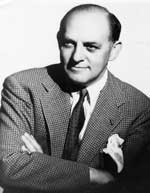

| Barney Balaban | Louis B. Mayer |
| James F. Byrnes | Dore Schary |
| Harry Cohn | "General" Nicholas Schenck |
| William Goetz | Mendel Silberberg |
| Samuel Goldwyn | Spyros Skouras |
| Eric Johnston | "Major" Albert Warner |

Contradiction is the best word for Harry Cohn, the feisty bastard who built and ran Columbia Pictures. He once fired an employee who stood up for him by saying that "every time I see you from now on I'll know that I owe you a favor, and I cannot have that." His motto was "he who eats my bread sings my song," and demanded loyalty from all his employees. At the same time, he disparaged anyone who would come to work for him (as opposed to Mayer who, once he hired someone, respected them for coming aboard MGM).
From all accounts, Cohn reveled in power and used it more hurtfully than anyone else in Hollywood. You could always tell where he was by the scent of his Carnival in Venice cologne, and carried a cigar tucked within his breast pocket, covered with a colored handkerchief. Said one associate, "When he reaches for that cigar -- duck!" He absolutely lived on the telephone and always had one near him. Like Mussolini (whose picture he had on his wall), Cohn would use theatrical devices to make others crumble in his presence: a large office, a desk set forty feet from the door, chairs of differing heights to intimidate visitors, and so forth. A summons to Cohn's office was like a call to the Principal's office; his bluntness played on other people's fears and weaknesses. Some, like executive Max Youngstein, insist that this was strategic; he didn't respect anybody who wasn't as tough as he was (even though he would win by any means, even dirty ones), and that strong convictions in others equaled ability. But others -- most, in fact -- say that Cohn was just one mean bastard, period.
Harry Cohn grew up in poverty, got a job as a trolley conductor (stealing most of the fares) and then a song plugger for sheet music publishers. It took persistence, and he learned it well. Soon he plugged himself into Universal Pictures by hanging onto the movie rights for some of the song titles he sold. Once in California he joined with brother Jack (also at Universal) and lawyer Harry Brandt in CBC Pictures; with a loan from Giannini (Bank of America) they made B pictures. From that grew Columbia, and thanks to Frank Capra, Columbia became, well, Columbia.
Where other Hollywood Jews tried to downplay their Judaism, Cohn actively disparaged it. Perhaps in Capra he saw vindication, not only for a Christian ethic but his own (the little man fighting the big men). It took Oscar, not Temple, to bring Harry Cohn into the Hollywood establishment with "It Happened One Night." And even then his victory was tarnished by having to share it with Capra.
Perhaps because he cultivated the image as ogre, Cohn kept his occasional charitable deeds private. He was known to have handed out Christmas bonuses to employees, financed operations, given checks to charity and picked up expenses for people who were between incomes. Often he would say, "Don't tell anybody I did this. I don't want to lose my reputation."
Perhaps HUAC humiliated Harry Cohn the most. On one hand, he resented anybody giving him orders. On the other, he didn't want to hand his east coast offices a loaded gun against him. In 1945 Ben Kahane and Mendel Silberberg visited Cohn and asked him to fire John Howard Lawson (who had written the acclaimed "Sahara" for Columbia) because they'd heard HUAC was going to name Lawson as a Communist. Cohn refused, despite the men's importuning. "No, I'm not going to fire him," Cohn said. But by the end of the HUAC hearings Cohn had no choice, so that, in the 1950s, when actor Larry Parks crawled through the mud and offered to abrogate his contract with Columbia, Cohn accepted and Parks' film career was ended.